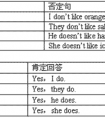按要求改写句子。1. I'm in Class One. (否定句) I ___________ ___________in Class One.2. We're from Britain.(否定句) We ___________ ___________ Britain.3.-五年级英语
题文
| 按要求改写句子。 |
| 1. I'm in Class One. (否定句) I ___________ ___________ in Class One. 2. We're from Britain. (否定句) We ___________ ___________ Britain. 3. She's an active girl. (否定句) She ___________ ___________ active girl. 4. He's smart. (否定句) He ___________ ___________ smart . 5. My mother is forty. (否定句) My mother ___________ forty. 6. Her brother's name's Bob. (否定句) Her ___________ name ___________ Bob. 7. You're from Australia. (否定句) You ___________ from Australia. 8. I like English. (一般疑问句) ___________ ___________ like English? 9. He has bright eyes. (一般疑问句) ___________ ___________ ___________ bright eyes? 10. She lives on Green Road. (一般疑问句) ___________ she ___________ on Green Rood? 11. We like playing football. (一般疑问句) ___________ ___________ ___________ plying football? 12. You have a small nose. (一般疑问句) ___________ ___________ ___________ a small nose? 13. The students come from Japan. (一般疑问句) ___________ ___________ ___________ ___________ from Japan? 14. Are you Tom? (肯定句) ___________ ___________ Tom. 15. Is his teacher thirty? (肯定句) ___________ ___________ ___________ thirty. 16. Do you like reading? (肯定句) ___________ ___________ reading. 17. Does Mary come from America? (肯定句) ___________ ___________ ___________ America. 18. We aren't Japanese. (肯定句) ___________ ___________ Japanese. 19. They don't come from China. (肯定句) ___________ ___________ ___________ China. 20. She doesn't look young. (肯定句) ___________ ___________ young. 21. You don't look like your mum. (肯定句) ___________ ___________ like you mum. 22. Does your sister have long hair? (肯定句) ___________ sister ___________ long hair. 23. Where do you come from? (同义句) _______________________________________________________________ 24. Glad to meet you. (同义句) _______________________________________________________________ 25. I'm from Canada. (同义句) _______________________________________________________________ 26. I'm Peter. (同义句) _______________________________________________________________ 27. What time is it? (同义句) _______________________________________________________________ |
答案
|
1. am not 2. aren't from 3. isn't an 4. is not 5. isn't 6. brother's, isn't 7. aren't 8. Do you |
据专家权威分析,试题“按要求改写句子。1. I'm in Class One. (否定句) I _________..”主要考查你对 否定句,名词,定冠词(the),物主代词,系动词,一般现在时,动词单数第三人称 等考点的理解。关于这些考点的“档案”如下:
否定句名词定冠词(the)物主代词系动词一般现在时,动词单数第三人称
考点名称:否定句
- 否定句:
表示否定的句子。必须有否定词。
否定句的构成形式:
a. 谓语为be动词时,“be+not "一名学生。
b. 谓语为实义动词而且没有情态动词和助动词时,“do/ does/ did+not"构成否定。
例:I do not like dancing. 我不喜欢跳舞。
He does not want to go to school. 他不想去上学。
c. 谓语为“情态动词+实义动词”时,“情态动词+not”构成否定。
例:You must not smoke. 你千万不要吸烟。
I can not catch it. 我抓不住它。 - 否定句在英语语法中可以分为九类:
(1)一般否定句
I don't know this. No news is good news.
There is no person(smoking)/not a person/not any person(smoking)in the house.
(2)特指否定
He went to his office, not to see him.
I am sorry for not coming on time.
I don't think/believe/suppose/feel/imagine you are right.
(3)部分否定
All the answers are not right
All is not gold that glitters
I don't know all of them.
I can't see everybody/everything.
Both of them are not right.
(4)全体否定
None of my friends smoke.
I can see nothing/nobody.
Neither of them is right.
Nothing can be so simple as this.
(5)延续否定
You didn't see him, neither/nor did I.
You don't know, I don't know either.
He doesn't know English, let alone/to say nothing of/not to speak of(更不用说)French.
(6)半否定句
We seldom/hardly/scarcely/barely hear such fine singing.
I know little English. I saw few people.
(7)双重否定
You can't make something out of nothing.
What's done cannot be undone.
There is no sweet without sweat.
No gain without pains.
I can't help /keep/ laughing whenever I hear it.
No man is so old but(that)he can learn.
(8)排除否定
Everyone is ready except you.
He did nothing but play.
But for your help, I couldn't do it.
(9)加强否定
I won't do it at all.
I can't see it any more.
He is no longer a boy. 否定转移的形式与用法:
一、动词的否定转移
1.形式上否定主句的谓语,实际上是否定从句的谓语
当动词“think”、“believe”、“suppose”、“imagine”、“expect”、“feel”的主语是第一人称,谓语动词为没有任何副词修饰的一般现在时,它们的否定式实际上是对宾语从句的否定。
表示说话者提出一种委婉的看法或主张。如:
I think that he will help us.——I don’t think that he will help us. 我认为它不会帮助我们。
I believe that he is right.——I don’t believe that he is right. 我认为他不对。
I suppose that he likes it.——I don’t suppose that he likes it. 我想他不喜欢它。
- 最新内容
- 相关内容
- 网友推荐
- 图文推荐
| [家长教育] 孩子为什么会和父母感情疏离? (2019-07-14) |
| [教师分享] 给远方姐姐的一封信 (2018-11-07) |
| [教师分享] 伸缩门 (2018-11-07) |
| [教师分享] 回家乡 (2018-11-07) |
| [教师分享] 是风味也是人间 (2018-11-07) |
| [教师分享] 一句格言的启示 (2018-11-07) |
| [教师分享] 无规矩不成方圆 (2018-11-07) |
| [教师分享] 第十届全国教育名家论坛有感(二) (2018-11-07) |
| [教师分享] 贪玩的小狗 (2018-11-07) |
| [教师分享] 未命名文章 (2018-11-07) |

![They ___________ like sweet things. [ ]A. don't B. aren't C. isn't-五年级英语](http://www.00-edu.com/d/file/ks/4/1/63/2019-08-31/small9cd523a0de82eff49e4ea07f34ddaa2f1567192691.gif)


![That's ___________jeep. It's a car.[ ]A. a not B. not C. not a D. not an-六年级英语](http://www.00-edu.com/d/file/ks/4/1/63/2019-08-31/small906a4f337e361f331d9a3de0dac7f65e1567192681.gif)

